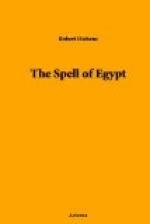And there the children play perpetually. And there the Egyptians sing their serenades, making the pipes wail and striking the derabukkeh; and there the women gossip and twitter like the birds. And the buffalo comes to take his sun-bath; and the goats and the curly, brown sheep pass in sprightly and calm processions. The obelisk there, like its brother in Paris, presides over a cheerfulness of life; but it is a life that seems akin to it, not alien from it. And the king watches the simplicity of this keen existence of Egypt of to-day far up the Nile with a calm that one does not fear may be broken by unsympathetic outrage, or by any vision of too perpetual foreign life. For the tourists each year are but an episode in Upper Egypt. Still the shadoof-man sings his ancient song, violent and pathetic, bold as the burning sun-rays. Still the fellaheen plough with the camel yoked with the ox. Still the women are covered with protective amulets and hold their black draperies in their mouths. The intimate life of the Nile remains the same. And that life obelisk and king have known for how many, many years!
And so I love to think of this intimacy of life about the temple of the happy dancers and the humble little wives, and it seems to me to strike the keynote of the golden coziness of Luxor.
IX
COLOSSI OF MEMNON
Nevertheless, sometimes one likes to escape from the thing one loves, and there are hours when the gay voices of Luxor fatigue the ears, when one desires a great calm. Then there are silent voices that summon one across the river, when the dawn is breaking over the hills of the Arabian desert, or when the sun is declining toward the Libyan mountains—voices issuing from lips of stone, from the twilight of sanctuaries, from the depths of rock-hewn tombs.
The peace of the plain of Thebes in the early morning is very rare and very exquisite. It is not the peace of the desert, but rather, perhaps, the peace of the prairie—an atmosphere tender, delicately thrilling, softly bright, hopeful in its gleaming calm. Often and often have I left the Loulia very early moored against the long sand islet that faces Luxor when the Nile has not subsided, I have rowed across the quiet water that divided me from the western bank, and, with a happy heart, I have entered into the lovely peace of the great spaces that stretch from the Colossi of Memnon to the Nile, to the mountains, southward toward Armant, northward to Kerekten, to Danfik, to Gueziret-Meteira. Think of the color of young clover, of young barley, of young wheat; think of the timbre of the reed flute’s voice, thin, clear, and frail with the frailty of dewdrops; think of the torrents of spring rushing through the veins of a great, wide land, and growing almost still at last on their journey. Spring, you will say, perhaps, and high Nile not yet subsided! But Egypt is the favored land of a spring that is already alert at the end of November, and in December is pushing forth its green. The Nile has sunk away from the feet of the Colossi that it has bathed through many days. It has freed the plain to the fellaheen, though still it keeps my island in its clasp. And Hapi, or Kam-wra, the “Great Extender,” and Ra, have made this wonderful spring to bloom on the dark earth before the Christian’s Christmas.




